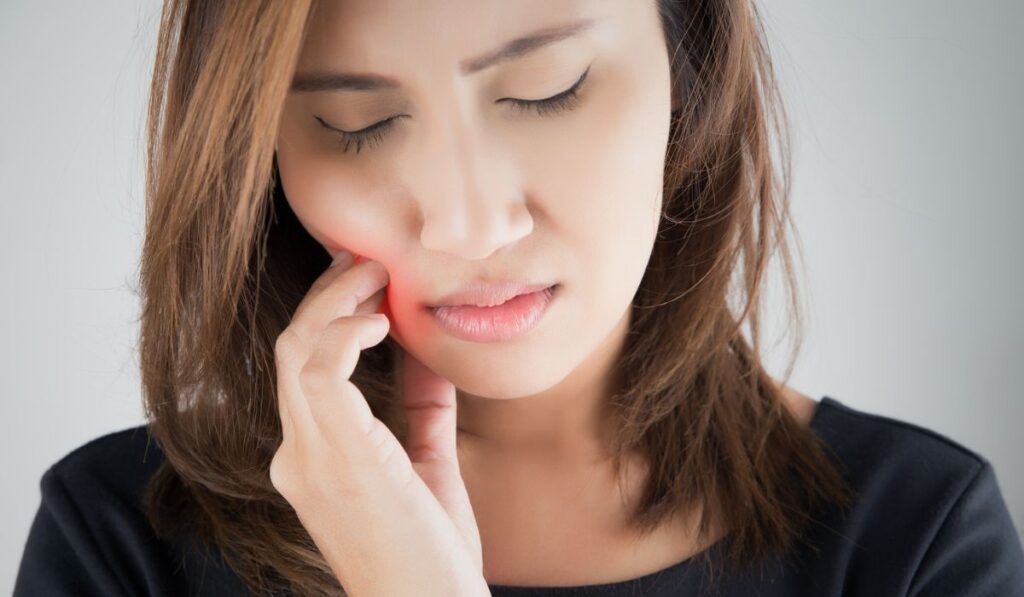Your back teeth, also known as the molars, are very sensitive despite how large and strong they are. When they hurt, they make it quite challenging to go about your day. So, why do your back teeth hurt?
Your back teeth may hurt because of tooth decay or sensitivity to hot or cold foods and beverages. The pain may also originate from an abscess, gum disease, a cracked tooth, or a sinus infection. You can treat pain short-term using topical anesthetics, but plan to visit your dentist soon.
Now that we have an insight into what could be causing the pain let’s look at some remedies so you can alleviate the pain and get back to enjoying your day-to-day life.
What Causes Pain in Your Back Teeth?

Several conditions can cause your back teeth to hurt. You can easily nurse some on your own while others call for a trip to the dentist. Here are the most common causes of pain in your back teeth:
Tooth Decay
Bacteria and food particle remnants in your mouth lead to tooth decay and the formation of cavities. Cavities are damaged areas on your teeth’ enamel that develop into tiny holes.
If your back teeth hurt due to a cavity, you’ll experience sharp or throbbing pain. However, you must seek treatment immediately as the hole might enlarge and affect deeper layers of your teeth, leading to severe toothache, infection, and tooth loss.
Sensitivity to Heat and Cold
While there might be other underlying issues, your molars may be hurting because they are overly sensitive to hot and cold foods and drinks. This mostly happens when you have thin enamel or recession.
Since the enamel acts as a protective layer for your tooth (it keeps away harmful particles and protects against harsh food temperatures), it becomes vulnerable and unable to withstand these temperatures when worn off.
Abscess
An abscess could also be the source of the relentless pain in your back teeth. It’s caused by a bacterial infection and forms a painful collection of pus just under the gumline at the roots of your teeth.
There’s no more precise indication of a tooth with advanced infection than an abscess. If you don’t rush for immediate treatment, which is generally a root canal, the pain will only worsen, and it will start to affect other teeth, which is never good.
Gum Disease
Gum disease, also known as gingivitis in its early stages and periodontitis in its advanced stages, is another cause of pain in your back teeth. Despite the stage of your gum disease, it could still have severe effects on your molars.
If left untreated, gum disease eats away the tissue and bone supporting your rear teeth, exposing them unusually, otherwise known as recession. This makes chewing painful, and irritation or inflammation might also occur.
Sinus Infection
Sinus infection (rhinosinusitis) is a condition where your nasal cavity is inflamed, swollen, and feels stuffed. It could result in pain to your upper rear teeth because of the proximity to the nasal passage. Apart from that, you may experience pain around your eyes or forehead. Sinus infection may be triggered by a cold or allergies.
A Cracked Tooth
A cracked tooth comes from biting or chewing hard foods, grinding your teeth at night, impacts to your mouth, and can even happen naturally from age. Dental jewelry can also cause cracking.
There are several types of cracks, including craze lines, fractured cusp, and vertical root fractures. Symptoms include pain when chewing, sensitivity to heat, cold, or sweetness, and gum swelling around the tooth.
If the tooth is salvageable, the recommended treatment is either a crown or a root canal. But if the crack is too far down the tooth and into the gum line, it will need to be removed and replaced with an implant.
Types of Pain to Be Aware of
You might think that an occasional ache is normal, but to be blunt, it’s a forewarning. The pain often implies there’s a problem in your mouth. Different kinds of tooth pain can help you pinpoint the source of your discomfort. Here are some of the most common types of dental pain to beware of:
- Sudden sharp pain in one or more teeth when biting or chewing.
- Sensitivity when drinking your hot cup of coffee in the morning or when eating ice cream.
- Persistent dull ache in the back of your mouth.
- Pulsating, throbbing pain may be accompanied by swelling.
Remedies for Back Teeth Pain
Back teeth pain can be overwhelming, leaving you desperate for quick relief. Here are a few remedies that can ease the discomfort instantly:
Rinsing with Warm Saltwater
Warm salt water loosens the tiny debris stuck between your teeth. It’s also an effective disinfectant and reduces inflammation. Just stir half a teaspoon of salt in a glass of warm water and rinse your mouth properly.
Rinsing with Hydrogen Peroxide
A 3% hydrogen peroxide solution can help eliminate pain and reduce inflammation. Dilute the hydrogen peroxide with equal amounts of water and rinse thoroughly, ensuring you don’t swallow it.
Cold Compress

If your pain is accompanied by swelling, a cold compress is just what you need. Put some ice cubes in a plastic bag, wrap them in a towel, and then hold them on the painful area for a few hours.
Pain Medication
Some over-the-counter pain medications can reduce pain and inflammation, such as aspirin, naproxen, ibuprofen, acetaminophen, and NSAIDs. You can also use a topical anesthetic like Orajel or Anbesol (both on Amazon) to get some relief.
When to Seek Professional Help
You need to seek medical attention as soon as possible if:
- Your toothache has been persistent for longer than one or two days.
- Your pain is unbearable.
- You also have a fever, earache, or feel pain when you open your mouth wide.
- You swell in the mouth or face.
Dental infections can go haywire and spread from your mouth to the skull or even to the bloodstream! In such a situation, the dentist may have to extract your tooth to prevent infections in your mouth from advancing to your body.


